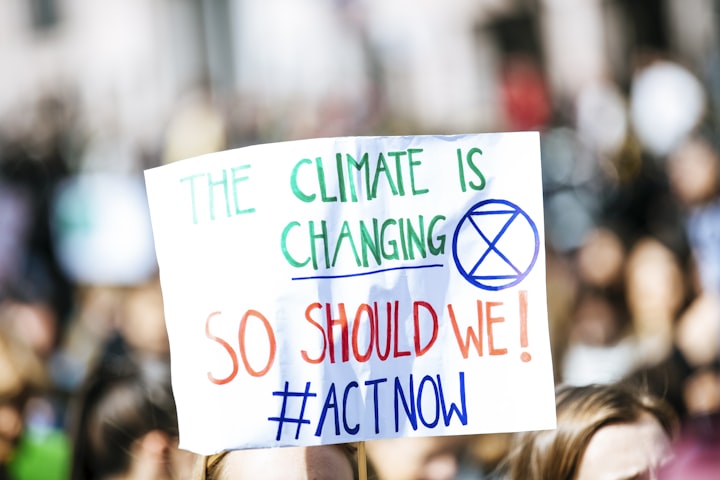Navigating Climate Change: A Call to Individual Action
Empowering People to Make a Difference in the Face of Global Crisis

Climate change is one of the most pressing challenges facing humanity today. It refers to long-term alterations in temperature, precipitation patterns, and other climatic elements on Earth, primarily driven by human activities such as the burning of fossil fuels, deforestation, and industrial processes. The consequences of climate change are far-reaching and impact various aspects of our lives, including the environment, economy, health, and social well-being.
Here are some key points about climate change and advice for individuals on how they can contribute to mitigating its effects:
Understanding Climate Change:
Scientific Consensus: Climate change is widely accepted by the scientific community as a reality. It is primarily driven by the increase in greenhouse gases like carbon dioxide (CO2) in the atmosphere, which trap heat and lead to a warming planet.
Individual Actions to Address Climate Change:
Reduce Carbon Footprint: Individuals can reduce their carbon footprint by decreasing their energy consumption. This can be achieved by using energy-efficient appliances, turning off lights when not in use, and using public transportation, carpooling, biking, or walking instead of driving alone.
Renewable Energy: Support and invest in renewable energy sources such as solar panels and wind turbines for homes or businesses. These technologies reduce reliance on fossil fuels and decrease greenhouse gas emissions.
Energy Efficiency: Improve the energy efficiency of your home by ensuring proper insulation, sealing leaks, and using smart thermostats. Reducing energy waste can significantly lower emissions.
Reduce, Reuse, Recycle: Practice the three Rs to minimize waste and decrease the environmental impact of production and consumption. Reducing consumption, reusing items, and recycling materials all help conserve resources and reduce emissions.
Sustainable Transportation: Opt for greener transportation options whenever possible. Use public transportation, carpool, or invest in electric or hybrid vehicles. For shorter distances, consider walking or cycling.
Reduce Meat Consumption: The livestock industry is a significant contributor to greenhouse gas emissions. Reducing meat consumption and choosing plant-based alternatives can lower your carbon footprint.
Support Sustainable Practices: Choose products and services from companies that prioritize sustainability and eco-friendly practices. By supporting environmentally responsible businesses, you encourage positive change.
Waste Reduction: Minimize waste by avoiding single-use plastics, composting organic materials, and being mindful of packaging when shopping.
Advocacy and Community Involvement:
Raise Awareness: Educate yourself and others about climate change and its impacts. Share information, engage in conversations, and encourage informed decision-making.
Support Policy Changes: Advocate for policies and regulations at local, national, and global levels that promote renewable energy, carbon pricing, and sustainable land use practices.
Community Action: Get involved in local environmental initiatives, such as tree planting, clean-up events, and conservation projects. Join or support organizations working towards climate solutions.
Vote Responsibly: Participate in elections and vote for leaders who prioritize climate action and environmental sustainability.
Reduce Water and Resource Usage: Conserve water and resources at home and in your community. Wasting water and overusing resources contribute to climate change.
Carbon Offsetting: Consider supporting carbon offset projects that help balance your carbon emissions. These projects often involve activities like reforestation and renewable energy initiatives.
Addressing climate change is a collective effort that requires individuals, communities, businesses, and governments to work together. While individual actions are important, systemic change is also crucial. By making sustainable choices, advocating for climate-friendly policies, and fostering a sense of responsibility for the environment, we can collectively work towards a more sustainable and resilient future for our planet.
About the Creator
wissal charraki
Software engineering student | Writing, painting, acting enthusiast 🎨🖋️🎭 | Museums and reading books inspire my words 🏛️ | Exploring art, words, colors, and emotions together 🌟✨ #CreativeSoul






Comments
There are no comments for this story
Be the first to respond and start the conversation.